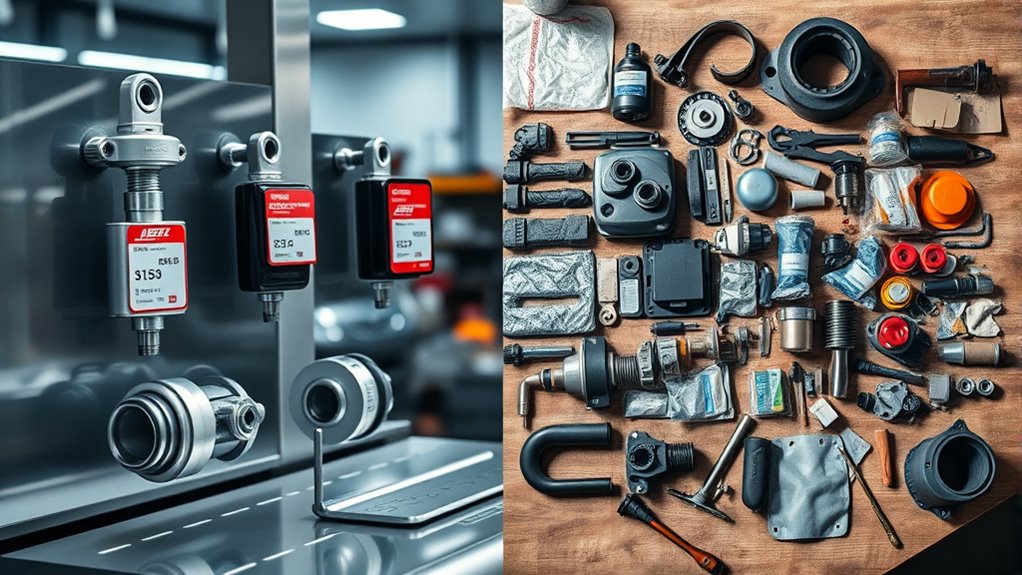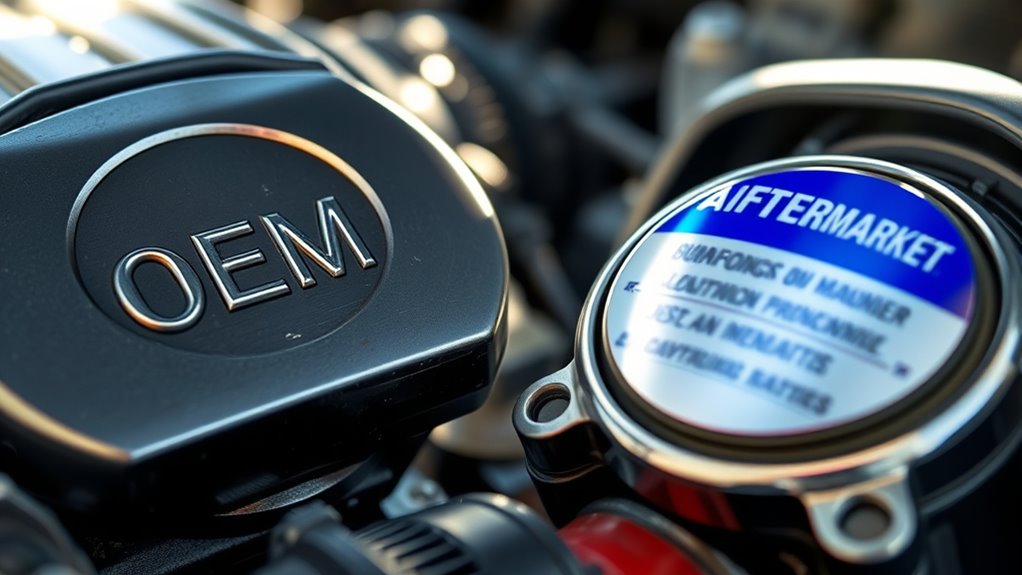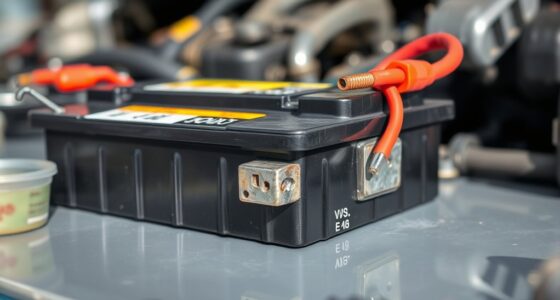Choosing between OEM and aftermarket parts depends on your priorities. OEM parts are made by your vehicle’s manufacturer, ensuring perfect fit, reliability, and a matching warranty, but they tend to cost more. Aftermarket parts are cheaper and offer a variety of options, but quality and fit can vary, potentially leading to more repairs later. If you want to make an informed decision and understand all the pros and cons, there’s more to explore.
Key Takeaways
- OEM parts are made by the vehicle’s manufacturer, ensuring perfect fit and function, while aftermarket parts are produced by third-party companies with variable quality.
- OEM parts usually come with longer, more comprehensive warranties, offering better protection compared to often shorter or less reliable aftermarket warranties.
- OEM parts tend to be more expensive upfront but can be more cost-effective long-term due to better durability and performance.
- Aftermarket parts vary widely in quality and compatibility; thorough research is essential to avoid fitting issues or reduced vehicle longevity.
- OEM parts support vehicle reliability and resale value, whereas aftermarket parts may be suitable for non-critical or older vehicles but with potential trade-offs.

Are OEM parts better than aftermarket options? That’s a question many vehicle owners ask when it’s time for repairs or replacements. OEM, or Original Equipment Manufacturer parts, are made by the same company that produced your vehicle. They’re designed to fit perfectly and function exactly as the original parts did. On the other hand, aftermarket parts are produced by third-party manufacturers, often at a lower cost. When considering these options, you need to think about warranty implications and cost effectiveness. OEM parts typically come with a warranty that mirrors your vehicle’s original coverage, which can give you peace of mind knowing that any defects or issues are likely to be covered. Aftermarket parts, however, may have shorter or less thorough warranties, and sometimes, their quality can vary. That’s an important factor to weigh if you want to avoid future expenses or potential repairs caused by subpar components.
Cost effectiveness is another key aspect. OEM parts tend to be more expensive because they’re made to exact specifications and often come with the brand’s reputation for quality. But in the long run, they can be more cost-effective if they last longer and perform better, reducing the need for frequent replacements. Aftermarket parts, by contrast, are generally cheaper upfront. This might seem appealing if you’re on a tight budget, but cheaper isn’t always better. Sometimes, lower-quality aftermarket parts may wear out faster or cause compatibility issues, leading to additional repairs and expenses. You need to take into account whether saving money initially will pay off over time or if investing in OEM parts will save you money down the line by avoiding repeated repairs. Additionally, selecting parts that align with the origin of the brand can influence their overall quality and compatibility.
Another point to consider is the reliability of the part and how it affects your vehicle’s performance. OEM parts are engineered to meet the exact standards of your vehicle, which means they typically provide better fit, function, and longevity. Aftermarket options can vary widely in quality, so it’s essential to research brands and reviews before making a choice. If you prioritize maintaining your vehicle’s original performance and resale value, OEM parts are often the safer bet. However, if you’re willing to accept some variability in quality for a lower price, aftermarket parts might be suitable, especially for non-critical components or older vehicles. Ultimately, weighing warranty implications and cost effectiveness can help you make a more informed decision that aligns with your budget, expectations, and vehicle needs.
Frequently Asked Questions
Are Aftermarket Parts Always Inferior to OEM Parts?
You might wonder if aftermarket parts are always inferior to OEM parts. The truth is, quality control varies among manufacturers, so some aftermarket parts meet or even exceed OEM standards. They often offer cost effectiveness, making them a great option if you’re on a budget. However, it’s essential to research brands and reviews to verify you get reliable, high-quality parts that won’t compromise your vehicle’s performance.
Can Using Aftermarket Parts Void My Vehicle Warranty?
Think of your vehicle’s warranty as a delicate dance. Using aftermarket parts can sometimes trip the steps, affecting warranty implications if manufacturer policies see the part as non-compliant. To keep your warranty intact, check your manufacturer’s guidelines first. If you choose aftermarket, verify the parts meet quality standards and are installed correctly, so you don’t risk voiding your warranty or facing future repair issues.
How Do OEM and Aftermarket Parts Compare in Lifespan?
When comparing lifespan, OEM parts often have higher material durability due to strict manufacturing standards, ensuring they last longer. Aftermarket parts can vary considerably; some meet or exceed OEM standards, while others may fall short, affecting durability. You should consider brand reputation and quality certifications, as these factors influence how long the parts will last. Ultimately, high-quality aftermarket parts can match OEM lifespan, but lower-quality options may wear out faster.
Are There Specific Brands Known for High-Quality Aftermarket Parts?
You might wonder about specific brands known for high-quality aftermarket parts. Look for brands with strong reputation and proven track records, as these indicate reliable quality assurance. Brands like Bosch, Denso, and Delphi are recognized for their durability and consistency. Always research customer reviews and industry ratings to guarantee you’re choosing aftermarket parts that meet your standards for performance and longevity.
Do Aftermarket Parts Affect Vehicle Resale Value?
Think of your vehicle as a book; the stories inside matter most. When considering resale value, aftermarket impact can be a double-edged sword. Quality aftermarket parts might boost appeal or be seen as a sign of careful customization, but poorly made ones can lower resale value. Ultimately, the effect depends on the parts’ quality and how well they’re integrated, influencing potential buyers’ perceptions of your vehicle’s worth.
Conclusion
Choosing between OEM and aftermarket parts is like steering a vast sea—each option has its own currents and tides. OEM parts are your trusted lighthouse, guiding you with reliability, while aftermarket parts are the adventurous waves, offering variety and potential savings. Ultimately, your decision shapes your vehicle’s journey—whether you steer with certainty or explore new horizons. Trust your intuition, and remember, the right choice keeps your ride sailing smoothly through life’s unpredictable waters.









